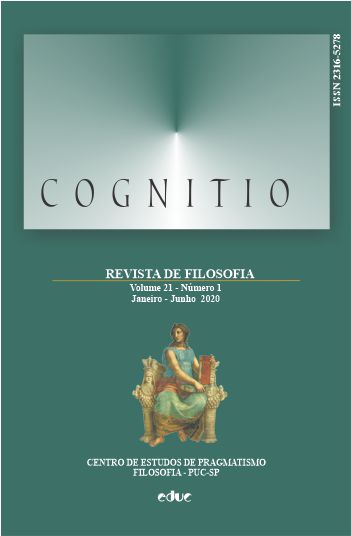Sobre as verdades vividas das atmosferas: as qualidades de contextos existenciais
DOI:
https://doi.org/10.23925/2316-5278.2020v21i1p83-98Palavras-chave:
Atmosferas, Contextos, Dewey, Encarnação, Gernot Böhme, Polanyi.Resumo
Este artigo começa com uma afirmação de Dewey que retirada do contexto consiste no maior desastre que o pensamento filosófico pode incorrer. Ela explora o valor heurístico da noção de Dewey de um contexto não apenas para a filosofia, mas para o pensamento e a vida como um todo. Contextos possuem poder existencial profundo tanto que os temos encarnados em nós mesmos. Contextos funcionam como panos de fundo, conforme determinam embasamentos, influenciando de maneira ampla como ante-estruturas de nossas formas de sentimentos, nossos padrões de ação, e os idiomas nos quais nos descrevemos, bem como nossos mundos. Dewey também pensa em contextos como espécies de atmosferas ou brumas, conectando-os com as qualidades determinantes das situações problemáticas nas quais nós nos encontramos. Sustento o argumento de Dewey com ferramentas analíticas fornecidas pela análise da encarnação e da natureza tácita de premissas de Michael Polanyi, e pela exploração da noção de atmosferas e espaços harmonizados de Gernot Böhme. O reconhecimento dos diversos tipos de contextos, nos quais as pessoas vivem e a partir das quais elas falam, é essencial para chegarmos aos tipos de confiança que reduzem o apelo à força e possibilitam acordos em significados comuns enquanto reconhecem as raízes existenciais da diferença.Downloads
Publicado
2020-07-19
Como Citar
Innis, R. E. (2020). Sobre as verdades vividas das atmosferas: as qualidades de contextos existenciais. Cognitio: Revista De Filosofia, 21(1), 83–98. https://doi.org/10.23925/2316-5278.2020v21i1p83-98
Edição
Seção
Artigos Cognitio









